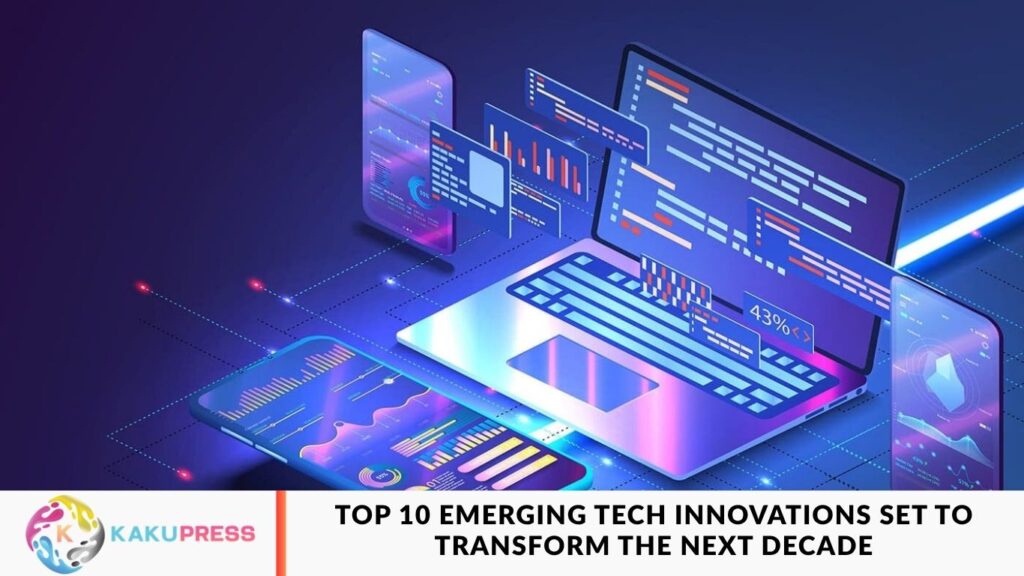Technology is advancing faster than ever, transforming industries and daily life. In the coming decade, revolutionary innovations will redefine how we live, work, and interact, creating new opportunities and solutions to global challenges. Here are the top 10 cutting-edge technological advancements set to shape the future.
Artificial Intelligence (AI) and Machine Learning
AI and machine learning are transforming industries worldwide, from healthcare to finance. In the coming years, AI-driven automation will boost efficiency, cut costs, and optimize decision-making processes.
Next-generation AI models will fuel breakthroughs in personalized medicine, autonomous systems, and real-time data analytics. Additionally, AI is set to revolutionize creative industries by producing high-quality content and automating tasks previously handled by humans.
Quantum Computing
Quantum computing is poised to tackle complex problems that classical computers cannot. Tech giants like Google and IBM, as well as innovative startups, are making remarkable strides in developing powerful quantum processors.
Over the next decade, quantum technology will transform cryptography, streamline supply chains, and accelerate drug discovery. Its unparalleled ability to process massive datasets simultaneously will revolutionize fields including climate modeling, financial forecasting, and advanced scientific research.
6G and Next-Generation Connectivity
The shift from 5G to 6G promises ultra-fast internet speeds, minimal latency, and enhanced global connectivity. Expected to roll out by the early 2030s, 6G networks will enable real-time holographic communication, seamless AI-powered applications, and smarter, more connected city infrastructures.
Next-generation 6G connectivity will transform virtual and augmented reality experiences, revolutionizing industries such as gaming, healthcare, and education.
Bioprinting and Regenerative Medicine
Bioprinting technology is revolutionizing healthcare by enabling organ regeneration and advanced tissue engineering. Scientists are already creating 3D-printed skin, bones, and functional organs with remarkable precision.
In the next decade, bioprinting could end lengthy transplant waitlists and deliver personalized medical treatments. Combined with gene-editing tools like CRISPR, regenerative medicine is poised to offer groundbreaking solutions for chronic illnesses and genetic disorders.
Autonomous Vehicles and Smart Transportation
Self-driving technology is evolving rapidly, with leaders like Tesla, Waymo, and established automakers pushing toward fully autonomous vehicles. Over the next decade, advancements in AI, sensors, and smart infrastructure will bring autonomous driving into the mainstream.
These innovations will create safer roads, reduce traffic congestion, and lower transportation costs. Smart transportation systems powered by AI and IoT will further optimize traffic management and improve public transit efficiency.
Space Exploration and Colonization
The coming decade will see unprecedented growth in space exploration, led by private companies such as SpaceX and Blue Origin, as well as NASA’s Artemis program. Ambitious plans for lunar bases, Mars colonization, and asteroid mining are already underway.
Innovations in reusable rocket technology and advanced space habitats will make interplanetary travel more achievable. These breakthroughs will expand humanity’s presence in space while driving advancements in materials science, energy production, and space-based manufacturing.
Brain-Computer Interfaces (BCIs)
Brain-computer interfaces (BCIs) are set to bridge the gap between the human brain and digital systems, enabling seamless communication between neural networks and external devices. Companies like Neuralink are pioneering BCIs that could transform medical treatments for paralysis, neurodegenerative disorders, and mental health conditions.
BCIs may allow humans to control computers and smart devices using just their thoughts, unlocking unprecedented levels of human-computer integration.
Sustainable Energy Innovations
As the world shifts toward sustainability, advancements in renewable energy will be pivotal. Over the next decade, innovations in solar, wind, and fusion energy will significantly reduce reliance on fossil fuels.
Breakthroughs in energy storage technologies, including solid-state batteries and hydrogen fuel cells, will improve efficiency and reliability. Combined with smart grids and AI-powered energy management systems, these developments will optimize power distribution, minimize waste, and lower energy costs.
Advanced Robotics and Automation
The next decade will witness major advancements in robotics, enabling machines to perform increasingly complex tasks across industries. Humanoid robots, AI-powered assistants, and robotic process automation will revolutionize manufacturing, healthcare, and logistics.
Cutting-edge robotics will also play a critical role in disaster response, space exploration, and elder care, boosting productivity, safety, and efficiency across multiple sectors.
The Metaverse and Extended Reality (XR)
The metaverse, fueled by virtual reality (VR), augmented reality (AR), and mixed reality (MR), is set to transform digital experiences. Over the next decade, innovations in XR technology will create immersive virtual environments for social interaction, work, education, and entertainment.
Leading tech companies like Meta, Microsoft, and Apple are investing heavily in metaverse development, poised to revolutionize remote work, e-commerce, and digital collaboration.
Frequently Asked Questions
What are the top emerging tech innovations for the next decade?
The top emerging technologies include AI and machine learning, quantum computing, 6G connectivity, bioprinting, autonomous vehicles, space exploration advancements, brain-computer interfaces (BCIs), renewable energy innovations, advanced robotics, and the metaverse with VR/AR/MR integration.
How will AI and machine learning impact industries in the next decade?
AI and machine learning will optimize decision-making, automate repetitive tasks, and drive innovation across healthcare, finance, the creative industries, and personalized services.
What is quantum computing, and why is it important?
Quantum computing uses quantum bits (qubits) to process massive datasets simultaneously, offering breakthroughs in cryptography, drug discovery, climate modeling, and financial forecasting.
When will 6G networks become available, and what will they offer?
6G networks are expected by the early 2030s, providing ultra-fast internet speeds, minimal latency, AI-driven applications, smart city integration, and immersive virtual/augmented reality experiences.
How will bioprinting transform healthcare?
Bioprinting enables the 3D printing of organs, tissues, and personalized treatments, potentially eliminating transplant waitlists and offering solutions for chronic diseases and genetic disorders.
What advancements are expected in autonomous vehicles?
Autonomous vehicles will become mainstream with improvements in AI, sensors, and infrastructure, leading to safer roads, reduced traffic congestion, and optimized public transportation systems.
How will space exploration evolve in the next decade?
Private companies and space agencies like SpaceX, Blue Origin, and NASA are advancing lunar bases, Mars colonization, asteroid mining, reusable rockets, and space habitats, expanding human presence and scientific breakthroughs.
Conclusion
The next decade will see AI, quantum computing, 6G, bioprinting, autonomous vehicles, robotics, and the metaverse transform industries and daily life. These innovations will boost efficiency, connectivity, and sustainability while opening new possibilities in healthcare, education, entertainment, and space exploration, shaping a smarter, more connected future.

